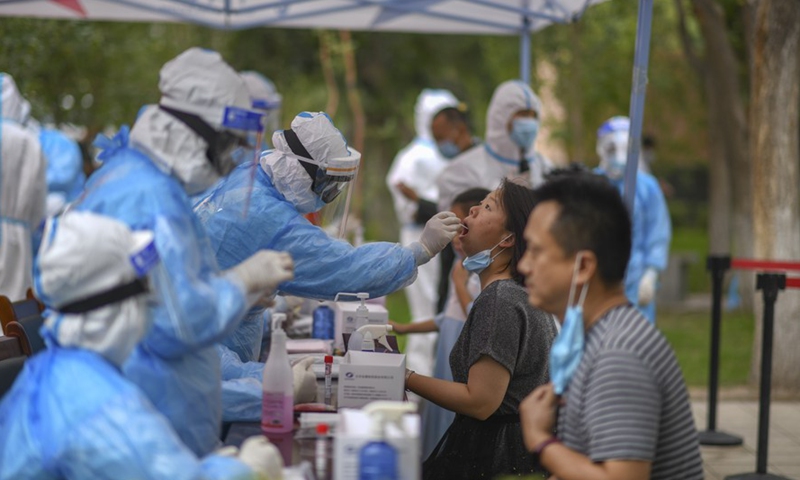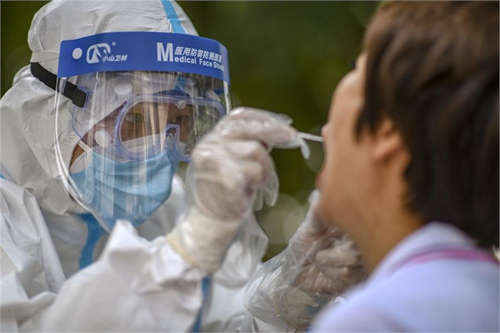Urumqi virus strain similar to Beijing’s: experts
Makeshift hospitals could help prevent rise in community transmission

Medical workers collect swab samples for residents at Tianshan District in Urumqi, northwest China's Xinjiang Uygur Autonomous Region, July 20, 2020. Urumqi is carrying out free nucleic acid tests for all residents and people who are visiting the city, in a bid to screen for novel coronavirus infections and reduce the risk of the epidemic spread.Photo:Xinhua
The spike in COVID-19 cases in cities in Northwest China's Xinjiang Uygur Autonomous Region has drawn national attention with 41 new confirmed cases and 38 asymptomatic ones reported on Monday.
Experts said that gene sequencing of the virus in Xinjiang is similar to the viral strain of Beijing's recent outbreak, and that with support from across China, the region is expected to bring the situation under control within one to two weeks.
Among the 41 confirmed cases, 15 patients had previously tested positive but were asymptomatic. The total number of confirmed cases in Xinjiang is 178 with one in Kashi Prefecture and one in the Xinjiang Production and Construction Corps, according to a release from Xinjiang regional health commission. As of press time on Monday, a total of 8,795 people are under medical observation.
The large number of asymptomatic infections in Urumqi is a result of early nucleic acid tests, a local expert said.
Many patients were tested before they showed symptoms, which is a good sign for epidemic control, Zhang Yuexin, a medical expert who is part of the Xinjiang anti-epidemic group and professor of the infectious disease department of the First Affiliated Hospital of Xinjiang Medical University, told the Global Times on Monday.
Yang Zhanqiu, a deputy director of the pathogen biology department at Wuhan University, told the Global Times that the summer season and high temperatures might weaken the effect of the virus on individuals so they display fewer symptoms.
The infectivity of the coronavirus also varies with different individual's immunity, ethnic groups, races and gene types, Yang said.
The sudden outbreak of COVID-19 in Urumqi following the one in Beijing in June has drawn national attention. Medical staff from many provinces went to aid Urumqi and many of them are helping with nucleic acid testing in the city, which is seeking to test all its residents, as well as a second round of testing for residents living in key areas, like Tianshan and Shayibake districts.
Zhang told the Global Times that that gene sequencing of the novel coronavirus in Urumqi is similar to the viral strain seen in Beijing's recent outbreak. Previous reports said that the coronavirus strain detected at the Xinfadi market in Beijing came from Europe.
Health authorities in Xinjiang revealed the first COVID-19 patient in Urumqi is a woman working in Zhongquan Square and was confirmed on July 15. Other transmission paths of infections have yet to be released to the public.
The Global Times learned that the outbreak in Urumqi related to a wedding party with likely several hundred people being involved. Some wedding rituals, like kissing each other on the cheeks and holding hands, may help spread the virus.
Meanwhile, epidemiological investigations in the region may be prolonged by language barriers as it may take more time for researchers to communicate with patients of ethnic groups, especially elderly ones who cannot clearly remember and express their interactions in previous days, according to Zhang.
Hospitals in the city feel greater pressure as the infection numbers are increasing but available medical resources are enough to deal with the situation, Zhang said, noting that the hospital he works in has about 800 to 1,000 beds available.
The expert noted that the number of newly confirmed infections in Urumqi may see a downward trend four or five days later as some asymptomatic patients will gradually show symptoms after a 14-day incubation period.
Some doctors and experts reached by the Global Times said that building makeshift hospitals in Urumqi to take care of people who have been in close contact with confirmed cases would be of benefit to prevent further community transmission.
Yang said that the situation in Xinjiang is expected to be under control within one to two weeks. China now has much experience in dealing with sudden emergences of infections in some places and the ongoing mass testing in Xinjiang will help screen out asymptomatic cases, Yang noted.
"As the whole nation is also ready to help Xinjiang, it will be fine," he said.




